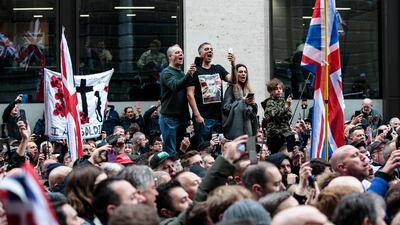An intricate network of far-right hate groups has flourished in the UK and around the world, pushing dangerous messages of division, the Tony Blair Institute says.
To fight the spread of extremism, the institute has recommended laws to designate some extreme-right groups and ban activists from mainstream media.
The call comes in a report from the former British prime minister and Jacqui Smith, a former home secretary and head of the Jo Cox Foundation, which was set up in memory of the MP who was killed in an extremist attack.
The two said restrictions on activity with links to violent extremism had been limited and unco-ordinated.
Groups such as Britain First and Generation Identity, which believe in a fundamental conflict between the West and Islam, have been able to spread their message of division with impunity, the paper claims.
“We need to return to the vexed problem of how to identify the link between violent and non-violent extremism, and develop a coherent policy approach to tackling the threat of far-right groups,” Ms Smith said.
Her foundation was set up after the murder in 2016 of Labour MP Jo Cox by a gunman who had sympathies with racist and far-right views.
“As we know only too well in the Jo Cox Foundation, what starts as hate-fuelled rhetoric can end in the terrorist murder of a serving MP, wife and mother,” Ms Smith said.
The paper outlines shortcomings after the Christchurch mosque attacks when members of Generation Identity were interviewed by the BBC.
And while leaders of Britain First have been jailed for religiously aggravated harassment after intimidating Muslim families, the group was still allowed to register with the electoral commission in Northern Ireland.
Statistics gathered by the report show religious hate crime in the UK has surged by 40 per cent between 2016-2017 and 2017-2018.
Hate crime against Muslims has been the main driver for the rise, with an increase of 26 per cent.
Figures show that the rise can also be seen across Europe and North America.
Instances of hate crimes online have also risen, from 311 in 2016 to 362 in 2017.
The paper calls on politicians to also work with social media companies to define the limits of acceptable content.
In a report called The Narratives of Hate, the Blair Institute identified common threads running through right-wing organisations, including a theme of victimisation.
Members of the groups often believe a “white genocide” is taking place in Europe.
The groups commonly use anti-Muslim themes to stoke hatred, the report has shown.
Britain First has regularly claimed that Islamic scriptures promote violent jihad and terrorism, and that Muslim immigration to western countries is paving the way to introducing Islamic law.
The UK advocacy group Hope Not Hate has shown how these kinds of far-right views have infiltrated far-reaching areas of British society.
A report by Ben van der Merwe, a British journalist working with the group, has shown links between Generation Identity and the designated far-right terrorist group National Action.
After five months in Generation Identity, Van der Merwe found a Royal Navy sailor involved with Britain’s Trident nuclear deterrent was also a member of the far-right group.
“These groups are far from innocuous,” said Azmina Siddique, a policy adviser at the Tony Blair Institute.
"Only last month, Generation Identity England activists gathered outside the Tower of London dressed as ISIS militants and simulated the beheading of two anti-racism activists.
“It is time that policymakers acted – by defining extremism and designating hateful groups – to stop such obviously malicious acts.

